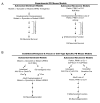Genetic animal models of Parkinson's disease
- PMID: 20547124
- PMCID: PMC2917798
- DOI: 10.1016/j.neuron.2010.04.034
Genetic animal models of Parkinson's disease
Abstract
Parkinson's disease (PD) is a progressive neurodegenerative disorder that is characterized by the degeneration of dopamine (DA) and non-DA neurons, the almost uniform presence of Lewy bodies, and motor deficits. Although the majority of PD is sporadic, specific genetic defects in rare familial cases have provided unique insights into the pathogenesis of PD. Through the creation of animal and cellular models of mutations in LRRK2 and alpha-synuclein, which are linked to autosomal-dominant PD, and mutations in parkin, DJ-1, and PINK1, which are responsible for autosomal-recessive PD, insight into the molecular mechanisms of this disorder are leading to new ideas about the pathogenesis of PD. In this review, we discuss the animal models for these genetic causes of PD, their limitations, and value. Moreover, we discuss future directions and potential strategies for optimization of the genetic models.
Copyright 2010 Elsevier Inc. All rights reserved.
Figures



References
-
- Abeliovich A, Schmitz Y, Farinas I, Choi-Lundberg D, Ho WH, Castillo PE, Shinsky N, Verdugo JM, Armanini M, Ryan A, et al. Mice lacking alpha-synuclein display functional deficits in the nigrostriatal dopamine system. Neuron. 2000;25:239–252. - PubMed
-
- Albrecht M. LRRK2 mutations and Parkinsonism. Lancet. 2005;365:1230. - PubMed
Publication types
MeSH terms
Grants and funding
LinkOut - more resources
Full Text Sources
Other Literature Sources
Medical
Molecular Biology Databases

